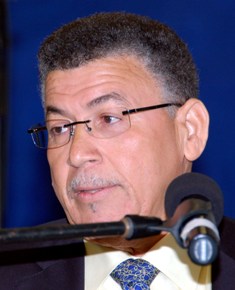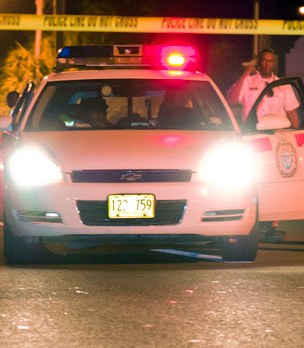Archive for November 13th, 2012

UK drilling down to environment in territories
 (CNS): In just over two weeks the Environmental Audit Committee in the UK will close its request for submissions regarding an inquiry which began in September on sustainability in the UK Overseas Territories (UKOTs). The committee is examining the environmental protections in all of its 14 territories, which altogether contain more biodiversity that the entire UK mainland, including 74 critically endangered species. The UK government is accountable for this biodiversity and, as a result, the audit will examine how it is fulfilling its responsibilities and obligations to protect the environment and may see Cayman eventually forced to enact the National Conservation Law.
(CNS): In just over two weeks the Environmental Audit Committee in the UK will close its request for submissions regarding an inquiry which began in September on sustainability in the UK Overseas Territories (UKOTs). The committee is examining the environmental protections in all of its 14 territories, which altogether contain more biodiversity that the entire UK mainland, including 74 critically endangered species. The UK government is accountable for this biodiversity and, as a result, the audit will examine how it is fulfilling its responsibilities and obligations to protect the environment and may see Cayman eventually forced to enact the National Conservation Law.
While the UK’s focus on the Cayman Islands has been financial in recent months, its stated aims in the White Paper, launched last year, make it clear that it is also concerned about the environment in its diverse collection of territories. Without any form of lawful protection for most of its land species and home to several of the 74 endangered species, Cayman may well be come under pressure from the UK, once again, to enact legislation.
During the current enquiry the committee will be examining whether or not the recommendations made in a 2008 report, Halting biodiversity loss, which looked at safeguarding biodiversity and practicing joined-up government to further conservation, have been implemented. It will also seek to find out if the UK government’s strategy is consistent with the conclusions and commitments on protecting biodiversity reached at the recent United Nations Rio+20 conference.
Among other issues, the committee will also look at how weaknesses in civil society and governance in the territories impact on conservation.

Mac forced to redo law
 (CNS): Following a rushed attempt to transpose the Framework for Fiscal Responsibility (FFR) into the Public Management and Finance Law (PMFL), the premier has been forced to redraft the law for the third time. While the debate continued in the Legislative Assembly on Friday on the second version of the bill making the agreement Premier McKeeva Bush had signed with the UK one year ago into law, legal drafters were forced to re-write the legislation once again. The original bill submitted to the LA ahead of this current meeting contained changes made by Bush which were unacceptable to the Overseas Territories Minister and which, after a standoff with the UK, were eventually changed.
(CNS): Following a rushed attempt to transpose the Framework for Fiscal Responsibility (FFR) into the Public Management and Finance Law (PMFL), the premier has been forced to redraft the law for the third time. While the debate continued in the Legislative Assembly on Friday on the second version of the bill making the agreement Premier McKeeva Bush had signed with the UK one year ago into law, legal drafters were forced to re-write the legislation once again. The original bill submitted to the LA ahead of this current meeting contained changes made by Bush which were unacceptable to the Overseas Territories Minister and which, after a standoff with the UK, were eventually changed.
In a rush to draw up new legislation as directed by the British, the law apparently failed to meet with the UK’s approval and has now undergone yet another change.
According to the governor’s office, the bill has now being reformatted to append the entire FFR as a schedule to the PMFL. “The necessary re-drafting has taken place and the document has this afternoon been sent to the FCO. I would expect the FCO to respond before Tuesday 13 November,” a spokesperson for the governor’s office said Friday afternoon.
Legislators were expected to return to the Legislative Assembly on Wednesday to continue debating the law, which will ensure that in future any government is bound within strict parameters when it comes to spending tax payers’ money. It requires that certain rigorous processes and value for money tests are carried out before government embarks on any major project involving the public purse or public assets of any kind.
Bush signed the agreement in November 2011 and has been trying to avoid putting the bill into local legislation ever since. However, following an about face over the document last Tuesday following a call with the FCO minister Mark Simmonds in London, a contrite Bush announced he would be placing the law at the top of the LA agenda and passing it exactly as the UK had requested.
Bush had previously attempted to change one of the clauses in order to increase the minimum value of a project to which the various checks, balances and other good-governance tests were applied from $10 million to $25 million, and to insert an additional clause making the FCO responsible for any reputational damage or financial loss the Cayman islands might suffer for following the parameters of the agreement.
The first draft of the legislation containing these clauses was rejected by the UK, and despite the rhetoric on Monday that Bush intended to stand up to the UK, he made a U-turn and brought a second version of the bill to the LA on Wednesday. However, while the second version incorporated the details of the FFR into the PMFL, some of the requirements, such as the rules governing the procurement process, were inserted into the regulations and not the substantive law.
On Friday, while members continued debating the second version of the law and one member of the UDP pressed on with the idea that a referendum was needed before the bill was passed, a third version was being prepared after the UK requested that the entire framework be incorporated into the substantial law.

Second man denies insurance courier robbery
 (CNS): A 32-year-old man from West Bay has denied being one of two men who held up a Sprint courier in the car park of a local insurance firm in George Town last month. Manuel Carter pleaded not guilty Friday to robbery and possession of an unlicensed firearm in connection with the daylight heist, which took place on 4 October at around 10am outside the offices of BritCay on Eastern Avenue. Carter is accused of threatening the driver with a semi-automatic pistol and then making off with around $9,000 in cash. John Ebanks (50) also from West Bay, who is charged with the same crime, remains unrepresented and has not yet entered any pleas to the charges.
(CNS): A 32-year-old man from West Bay has denied being one of two men who held up a Sprint courier in the car park of a local insurance firm in George Town last month. Manuel Carter pleaded not guilty Friday to robbery and possession of an unlicensed firearm in connection with the daylight heist, which took place on 4 October at around 10am outside the offices of BritCay on Eastern Avenue. Carter is accused of threatening the driver with a semi-automatic pistol and then making off with around $9,000 in cash. John Ebanks (50) also from West Bay, who is charged with the same crime, remains unrepresented and has not yet entered any pleas to the charges.
Both men appeared in court separately Friday. Carter was remanded to HMP Northward, while Ebanks was remanded at his own request to George Town police station.
The two men were arrested by police less than a week after the daylight robbery, in which just one man held up the courier and fled in a white Mitsubishi, which was recovered by police along with a firearm during a targeted operation.

Rapist seeks to change plea
 (CNS): A 32-year-old man from George Town who was convicted of abduction, rape and attempted rape after pleading guilty at the eleventh hour last month is now seeking to change those pleas. JeffreyBarnes admitted the crime, somewhat reluctantly, moments before his trial for kidnapping a 49-year-old woman from a bus stop and raping her in Admiral’s Landing. Facing a second charge for a separate allegation of rape, Barnes was due to be sentenced for the original conviction after that trial later this month. However, having sacked his original defence team, his second trial has now been postponed. Barnes is also attempting to reverse his earlier convictions.
(CNS): A 32-year-old man from George Town who was convicted of abduction, rape and attempted rape after pleading guilty at the eleventh hour last month is now seeking to change those pleas. JeffreyBarnes admitted the crime, somewhat reluctantly, moments before his trial for kidnapping a 49-year-old woman from a bus stop and raping her in Admiral’s Landing. Facing a second charge for a separate allegation of rape, Barnes was due to be sentenced for the original conviction after that trial later this month. However, having sacked his original defence team, his second trial has now been postponed. Barnes is also attempting to reverse his earlier convictions.
John Furniss, who has now taken on Barnes’ case, told the court Friday that he needed to discuss the charges with his client and see if it is possible for the guilty pleas entered last month to be vacated.
Justice Carol Beswick adjourned the case until 16 November to give Furniss time to deal with Barnes’ wish to withdraw his pleas and remanded him custody to HMP Northward.
With Barnes now convicted of the crime, the circumstances of which were read out to the court on 22 October ahead of a trial, there are limited circumstances under which the pleas can be vacated.
Related article on CNS:

European Union may open up to OT travellers
 (CNS): The European Commission has proposed adding five Caribbean Island Nations, 10 Pacific Island Nations and specific categories of British citizens currently under visa obligations that reside in some of Britain’s overseas territories to the list of third countries whose nationals are exempt from the visa obligation. It is now up to the European Parliament and to the Council of the European Union to make a final decision on the Commission proposal. This would mean easier travel to and from the various destinations as the countries included on the list would be expected to reciprocate, making it easier for Europeans to travel to the Caribbean and the various territories.
(CNS): The European Commission has proposed adding five Caribbean Island Nations, 10 Pacific Island Nations and specific categories of British citizens currently under visa obligations that reside in some of Britain’s overseas territories to the list of third countries whose nationals are exempt from the visa obligation. It is now up to the European Parliament and to the Council of the European Union to make a final decision on the Commission proposal. This would mean easier travel to and from the various destinations as the countries included on the list would be expected to reciprocate, making it easier for Europeans to travel to the Caribbean and the various territories.
The move is aimed at simplifying travel and nationals from the countries would no longer require a visa for short stays of up to 90 days if they have a relevant passport for business or pleasure.
"Traveling without a visa is not just a symbolic gesture – it will have a direct impact on citizens of these countries and on EU citizens, in the form of more people-to-people contacts and business opportunities," said Cecilia Malmström, EU Commissioner for Home Affairs.
In addition to the UK’s overseas territories, the list of proposed countries includes Dominica, Grenada, Saint Lucia, Saint Vincent and the Grenadines, Trinidad and Tobago, Kiribati, the Marshall Islands, Micronesia, Nauru, Palau, Samoa, the Solomon Islands, Tonga, Tuvalu and Vanuatu and Timor-Leste.